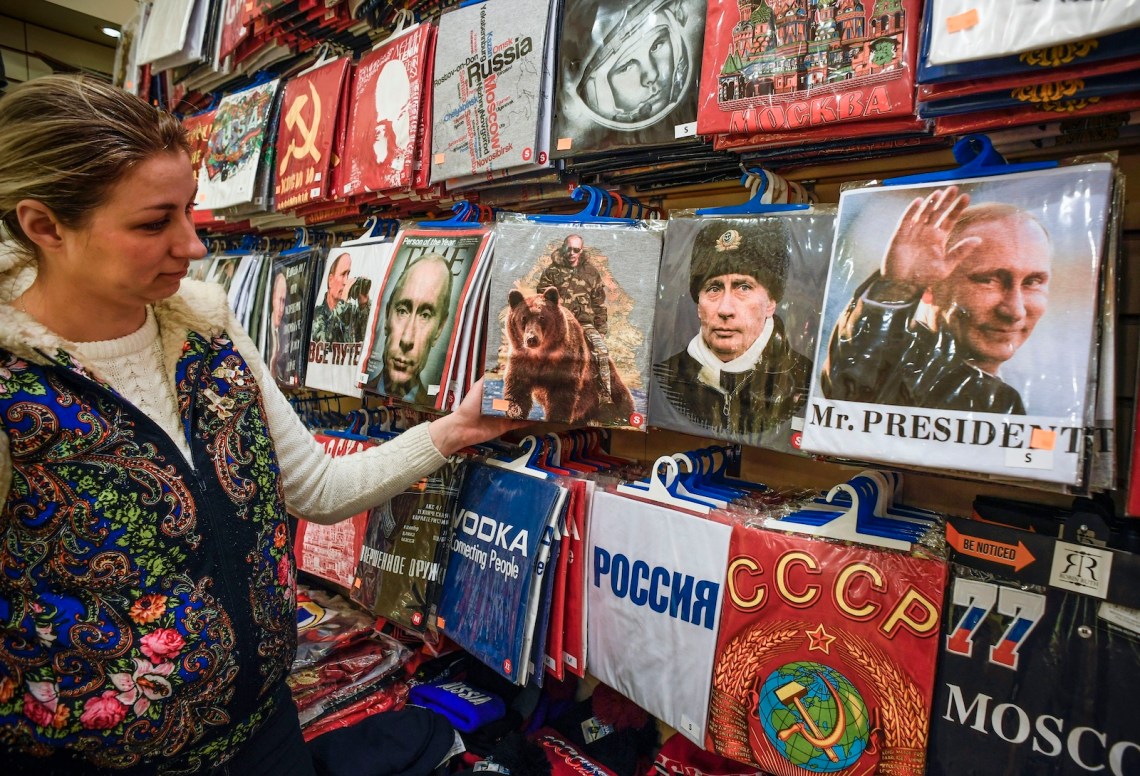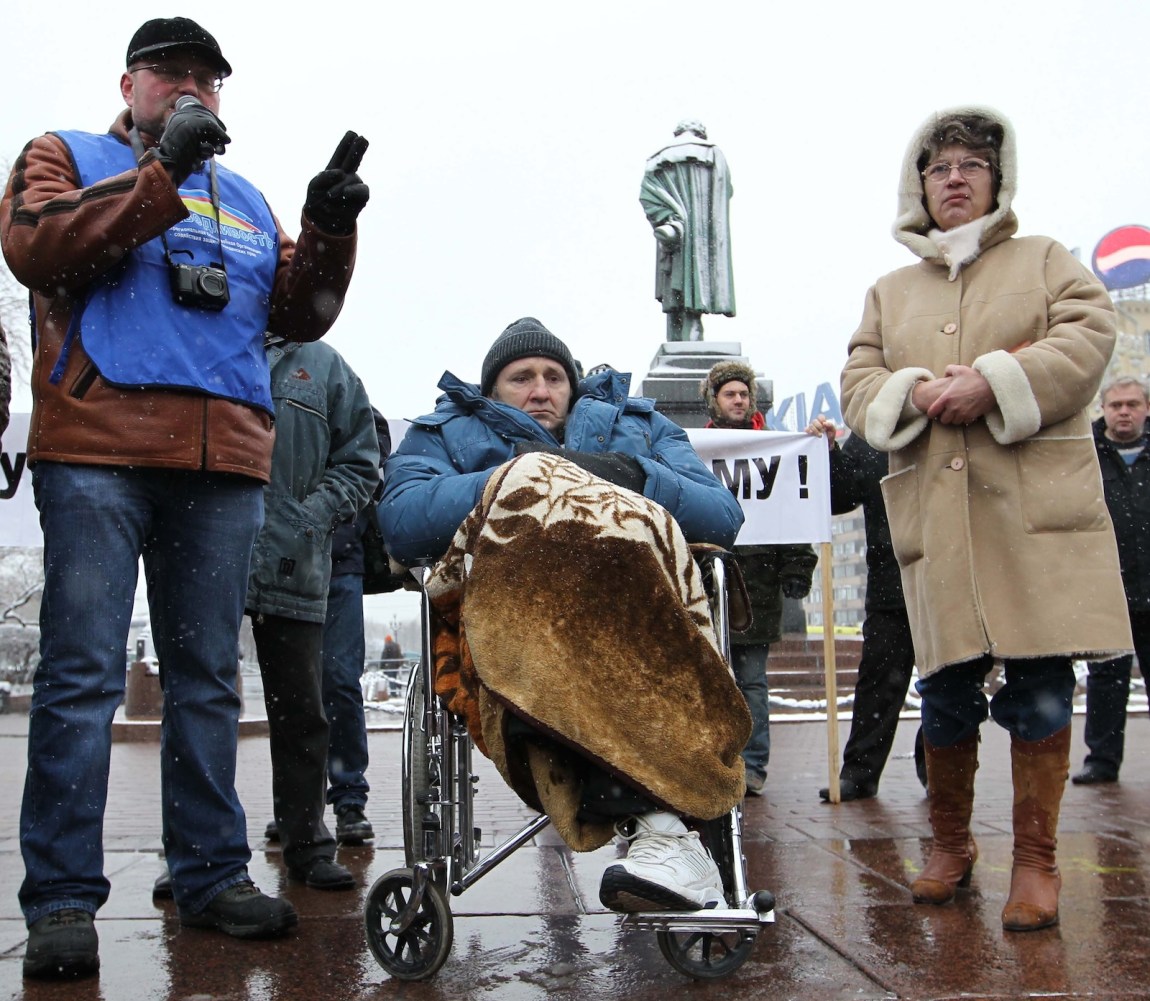Every time a foreign friend asks me about elections in Russia, I go through a familiar cycle: first awkwardness, then confusion, then shame. I freeze inside. Now I will have to tell them.
I smile stupidly and choose my words: “We don’t exactly have elections in Russia.”
We have a ritual called an election. On election day you can go to a school or a hospital or a factory cafeteria, where the atmosphere is festive: music plays over speakers and people sell cheap food, like hand pies with meat and rice. You acquire a ballot with the candidates’ names on it, enter a booth, put an X beside a name, and slip it through the slit of a special box. Then you go home and turn on your television and they tell you whom you voted for.
The television always lies. Everyone knows that.
In 2016, before the big war, on a visit to Kyiv, I asked a Ukrainian friend, “Who is going to be your next president?” She was taken aback by my question. How was she to know the results before the elections took place? Her sixteen-year-old son set her straight. “She’s from Russia, Mama. Get real.”
*
When I was little my mother explained to me how democracy worked. She told me that every mayor, parliamentarian, governor, and even the president had to be chosen by the people. I was amazed: I get to choose my own president! I couldn’t wait to turn eighteen and vote.
In 2007, when I was nineteen, there were parliamentary elections. I read up on the platforms of all eleven parties. Rather than simply vote, I decided to become an election observer. I signed up for the job through the Russian Communist Party and was sent from Moscow to the village of Romodanovo in Mordovia—prison country. Today Morodvia has twenty-one prisons and prison colonies; prisoners make up over 4 percent of the population.
The polling station in Romodanovo was at a school. The head of the election committee examined my passport and noticed my American visa. “Who’s paying you? The Soros Foundation?”
This is what I saw. The voting booths—which had curtains for privacy, since voting is supposed to be a private act—were being used by two people at a time. A man accompanied many of the voters inside, one after the other. The locals identified him as a campaign worker for United Russia—the party in power, controlled by the Kremlin. I brought him to the attention of the committee. Perhaps, they told me, private voting was the rule in Moscow. Here in Morodvia they had always done it this way.
I wrote a complaint. In response, the committee members wrote complaints against me. They claimed I was interfering in the election process, that I was getting in the way of their work. They warned me: another complaint, and I would have to leave the premises. Look, there’s a policeman right there.
From time to time the committee members would go to “warm up” in a separate room with food and vodka. They tried to pour me some vodka, too. Without any embarrassment, they talked about how turnout was low, the “promised” voters had not quite shown up, and not enough ballots were being cast for United Russia. I turned on my recorder, which as a journalist I always carry with me. Some hours later it was stolen. They locked my coat and bag away in another room, hoping the cold would force me to leave.
I didn’t leave, and I wouldn’t until I got the tally of the votes. I got pushed around—“don’t stand here”—and mocked. “Will you receive a medal for every violation you find?” “We grew up in the Soviet Union and even we don’t have principles. You kids don’t have any, either.” “You’re going to leave, but I have to live here.” I was shocked, and the shock overrode my terror and disgust.
I had barely walked out the door when they adjusted the tally. The numbers I had fought for all day were changed. My vote, for the not-very-popular social democrat party, was stolen. Had I voted that day? Yes, I had put my ballot into the box. Had I participated in an election? No, I had not.
*
The next time I was an observer was during regional elections in 2009, in the town of Khimki, just outside of Moscow. Khimki is well known for being run by veterans of the Soviet–Afghan War, like former mayor Vladimir Strelchenko, as well as by various corruptioneers and criminals. They oversaw widespread theft of state property and cronyism in handing out contracts, had built a shopping mall over the mass grave of soldiers who fought in World War II, and were leveling parts of the Khimki forest for a highway.
Advertisement
Activists and journalists have been murdered or savagely assaulted in Khimki. One was my friend Mikhail Beketov, an exceptional investigative reporter who campaigned against the forest’s destruction. Four months before the elections, Mikhail was attacked by men who fractured his skull, broke his legs, and crushed his wrists with a baseball bat. He lost a third of his head, four fingers, his right leg, and the ability to speak. Knowing that he had wanted to observe the elections, I went in his place. (Five years later he died as a result of injuries sustained in the attack.)
In Khimki, the committee members were not at all shy about fraud. In order to make the tallies add up, they created an equation, where the number of required votes was labeled “x.” Then they got to counting. “It’s not adding up!” I heard the head of the committee say into a phone. “Go bigger? In what column?”
I held my recorder tight. When the committee head got the policemen to come after me to seize it, I ran to the bathroom and hid it in my boot. They did not pursue me further; back then police overseeing elections tried not break the law too obviously. I watched the tally being adjusted several times, right in front of me, under the pretext of “recounts.” “The rest of the precincts have already submitted their counts,” the committee head told me, smiling. “Nothing has changed. You’ve been hopping around here for nothing.” The criminals remained in power.
I observed elections again in 2012 in Tula, the weapons manufacturing capital of Russia, over a hundred miles south of Moscow. Some of the precincts there had claimed 98 percent voter turnouts in earlier parliamentary elections. I wanted to see how this was made to happen.
The 2012 presidential elections were preceded by the largest protest movement in modern Russian history. Putin, then prime minister, announced that he was trading positions with Dmitry Medvedev, then president. Thousands of people gathered in over a hundred cities, in what became known as the Snow Revolution. It was met by repression. Russia didn’t want to submit, so they used police clubs to beat Russians over the head.
Some of the observers at our polling station turned out to be fake. The real ones weren’t registered. We received messages from other precincts; empty containers designated for absentee ballots were being taken to hidden locations and then returned stuffed to the brim. Observers were blocked from riding along. Those who tried to follow were beaten and their tires slashed.
At our precinct the absentee ballot containers were hurriedly loaded into a car that took off. I ran out into the road in front of the vehicle, which kept coming at me. My feet moved faster than my head, I threw myself into a snowbank and lay there, upbraiding myself for my cowardice. Surely they weren’t really going to run me over. My hot cheeks, burning with shame, melted the snow. Later I learned that an observer at a neighboring precinct had also tried to stop a car with absentee ballots. The vehicle hit him and dragged him on its hood for several meters. This made me feel less ashamed, through the shame has never entirely left me.
After four hours, the containers were returned to the precinct, all of their ballots for Putin—415 votes. He was elected president.
*
I could go on with my sad tale, but what’s the point? Russia’s voting ritual keeps changing and shrinking. We’ve stopped voting for governors: now candidates are preselected and, effectively, appointed by the presidential administration. Elections have been stretched out to three days, which makes them harder to observe. They’ve introduced online voting, which is basically impossible to monitor—you are supposed to believe the numbers.
Russians were invited to vote in presidential elections in March. Antiwar candidates—such as Boris Nadezhdin and Yekaterina Duntsova—were simply not registered. Observers were once again deceived, beaten up, arrested. On February 17, the last day of voting, people who opposed the war showed up at their precincts at noon. It was their silent protest. They wanted to see each other’s faces. Some took their ballots to Alexei Navalny’s grave, an act they considered more meaningful than casting them in the state’s boxes. Others wrote in “love is more powerful than death.” One woman tossed an explosive into a ballot box; it blew off her arm.
Putin continues to be president. He rules over a country where citizens are jailed for calling the war a war, where people are scared to talk to strangers, where the television tells lie after lie—and the lies grow more deadly.
Advertisement
On March 22 terrorists attacked a concert hall in Moscow. The militants shot spectators with automatic weapons and then set the building ablaze; 144 people were killed. The Islamic State group took credit for the attack the following day. Nevertheless, Russian propaganda channels speculate on the involvement of Ukraine. They have a war to maintain.
Officers caught four suspected gunmen. One of them had his ear cut off and was forced to chew it; another had wires tied to his genitals, which were given electric shocks. The torturers posted videos of these acts on social media. Parliamentarians are discussing bringing back the death penalty for the terrorists. Putin is silent for now. But he will speak. After elections there is always a fresh round of repression, the regime gets tougher, the horror reaches a new level.
For the first time, I didn’t vote. Like millions of other Russians who have been forced to leave the country, I cannot go home. Nor can I go to an embassy. I am a criminal in the eyes of my government for reporting on the war in Ukraine.
The television said that 87.28 percent of Russians voted for Putin. Did we choose him? No.




